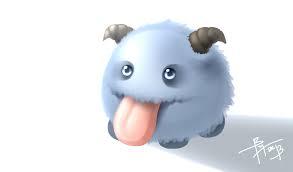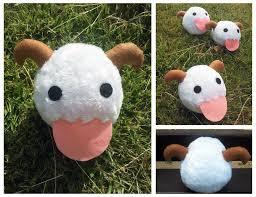[Perry] Quibbles
Welcome to A Trek Through the Literary Wilderness!
I’m your host, intrepid hunter and dashing gentleman, Perry!
…Why aren’t you applauding?
On today’s episode, we’ll be talking about an elusive, plentiful creature, the Quibble.
This is a quibble:
Quibbles are small, furry creatures with two short, slightly curled horns that they use to butt at words. They are a near-sighted creature, covered all around in white fur, adorable little stubby legs and a big, lollygagging tongue that they use to lick up punctuation.
Here is a rare shot of a quibble caught in action, in its natural habitat:
Please keep a close eye on that lolling tongue and the reckless and aimless circling movement as this is the key factor to what makes quibbles the annoying (yet completely adorable) nuisances that they are.
Finding Quibbles
Despite their somewhat elusive nature, quibbles have a very short breeding period so where you find one quibble, be prepared to find SEVERAL quibbles. The extra quibbles might be out of sight but rest assured, 9/10 times, they ARE there, and it’s on you to track the little buggers down.
It’s important to note that quibbles don’t mean to get caught up amongst the words of your document. They might seem a little malicious, but they’re really not.
You can track down quibbles by paying close attention to the flow of your document. Sometimes, when you’re reading and the rhythm of the sentence trips you up, you might find a quibble there. If something about a word you used keeps throwing you off, even though it’s grammatically sound, there might be a quibble stuck there as well.
Quibbles also like to misplace punctuation. They enjoy the taste of periods and commas and they’ll lick it up with their wide, flat tongues and scamper off with them, dropping them off in other places of the sentence.
You might want to be angry at the little buggers, and nobody would blame you for it.
But?
Look at these retarded little bastards:
Can you really stay mad at that happy face?
You’ll come across them in your document. Their white fur will have gotten caught on the brambles and burrs of your sentences. They’ll have gotten stuck on certain, specific words, even. When you find them, though, they’ll roll their eyes up to look at you, tongue lolling as they pant with happiness to see you.
If those suckers had tails, they’d be wagging them.
You might even find them in an exhausted heap, surrounded by punctuation that they’ve pilfered from here or there and misplaced.
It’s important to try not to be angry.
Quibbles actually feed off of negative energy and they tend to split off into multiple copies of themselves, through a process of cell mitosis, and propagate even further depending on how frustrated you are when you attempt to get rid of them.
Chasing Away Quibbles
Be calm.
There are easy ways to shoo quibbles away from your documents.
1) Quibbles are afraid of loud noises.
While quibbles can hide and camouflage easily among the words and punctuation marks of your document, you can easily tell where they might be hiding by reading aloud. When you read by a segment where a quibble might be hiding, keep an eye out for the telltale shiver and the flash of white fur to reveal their existence.
2) Travel with a friend.
Quibbles are adept at slipping by the notice of just one person. They’re small and squibbly and can easily hide within sentences and areas that you think you’ve checked.
Travel with a trusted companion and you will find more of the little buggers than you would have imagined possible. Oftentimes, the extra perspective that differs from your own is just the thing that will keep these things from remaining hidden in your document.
3) Resign yourself to the fact that you won’t catch them all.
Quibbles are a little bit insidious. No matter how many you find and chase out of your document, be sure that you will NOT have gotten them all. Given the rate at which they split and multiply, it’s flat out impossible. There will always be quibbles to chase away.
That being said? It’s important that you understand when it’s good enough.
You’ll never get them all. There will always be an aspect of your work that you could improve or tweak to make a little better. It’s just that, at a certain point, you start feeling the diminishing returns.
Every quibble you chase away makes chasing away the next quibble just a tiny bit less impactful. At a certain point, you really have to ask yourself whether it’s worth slogging down that country mile in order to chase down one solitary quibble that you see on the other end.
Learn to let go.
At a certain point, the quibbles are small enough that you should be able to let your document go without regret.
Learn to embrace that moment and you’ll be happier and stronger for it.
That just about wraps up this episode of A Trek Through the Literary Wilderness!
Stay tuned next week where I, your intrepid host, will brave the wilds of the Blog-engeti to track down the elusive and utterly dangerous Tamikins.
…I’m going to poke her with a stick. >.>”
Related posts:
[Perry] Choose Fanfiction – Beginnings
[Perry] Not Everything Needs to Make Sense
[Perry] Write What You Know
Taven Moore's Blog
- Taven Moore's profile
- 5 followers



